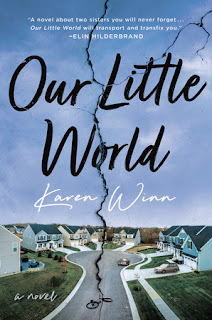 lives in Boston with her husband and two children.
lives in Boston with her husband and two children.
Winn applied the Page 69 Test to her new novel, Our Little World, and reported the following:
On page 69 in my debut novel, Our Little World, my twelve-year-old protagonist, Bee, and her sister, Audrina, are in lockdown after the disappearance of a neighborhood girl, Sally. It’s 1985, pre-World Wide Web, and the only way any neighborhood kids are getting information about what happened is through old-school phone gossip. Because Bee was there at the lake when Sally went missing, and because she is friends with Sally’s older brother, Max, Bee finds herself, unexpectedly, the center of attention. She relishes this position of powerVisit Karen Winn's website.and slowly reveals bits and pieces of information to her friends: what it was like at the lake that day, the last thing Sally said to her, even the current situation at Sally’s house when she visits Max.
This Page 69 Test works to a certain extent: Readers will understand that a child has gone missing; that it’s an unusual event in this otherwise safe and small, tightknit community; that Bee, my protagonist, was there at the lake when Sally disappeared; that it’s likely the 80s (since Bee’s family just got call waiting on their home phone); that it’s likely New Jersey (since one of the neighborhood fathers works for New Jersey Bell Atlantic); that Sally’s family is incredibly distraught (the dirty dishes are piling up); and that Bee is relishing the new attention she receives. Where this Page 69 Test falls severely short, however, is the lack of attention to the complex relationship Bee has with her sister, Audrina—which is the central focus of the novel.
--Marshal Zeringue





